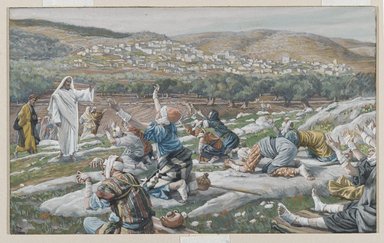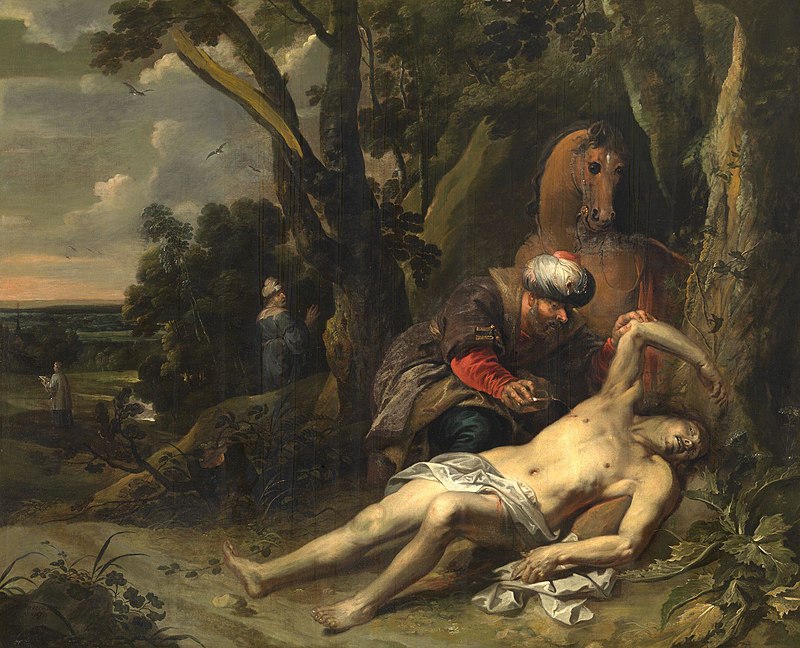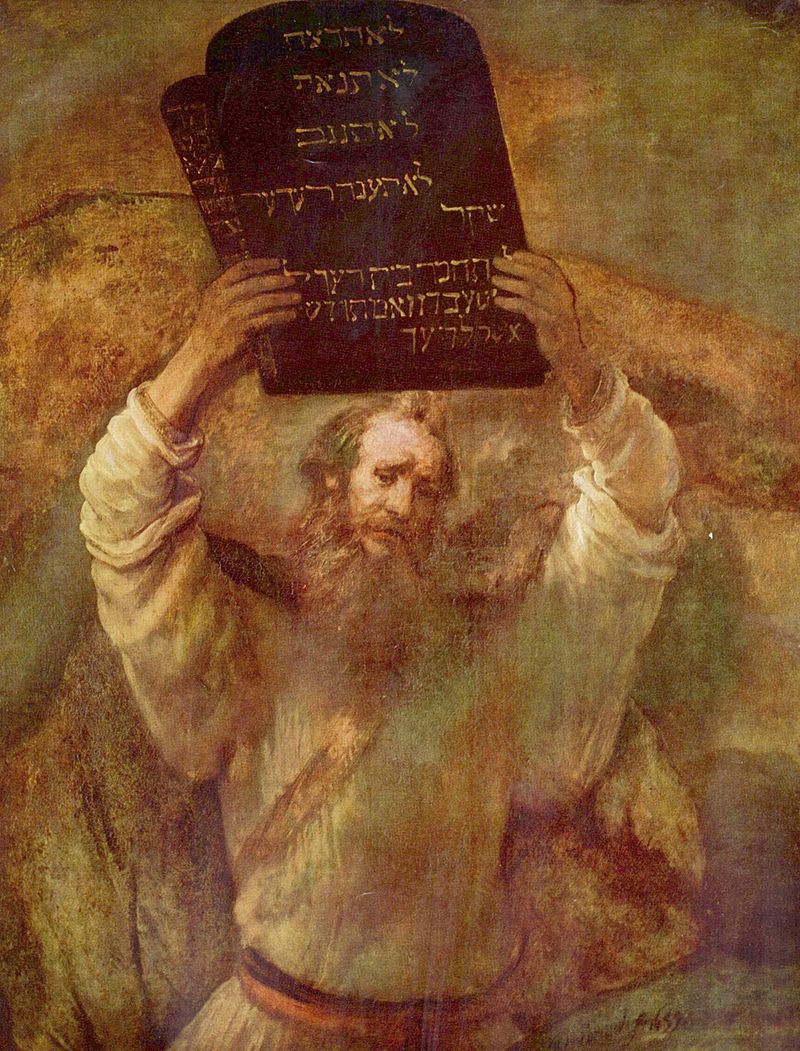Luke 17:11-19
September 13th, 2020
“Your faith has made you well.”, Jesus says to the cleansed leper from Samaria. How did Jesus know that the leper had faith? Faith is an activity of the heart. You cannot see faith. Only God can look at a man’s heart. So, you would probably answer that Jesus is God, so he is able to look into the heart of the leper and see his faith. And yes, Jesus is God! Yet, Jesus did not need to be God to see the leper’s faith. Anyone standing around with eyes and ears could clearly perceive that the man had deep faith. How could they perceive his faith if they could not look into his heart? Because the man cried out to Jesus for mercy. And when he saw that his leprosy was cleansed, he turned back to Jesus glorifying God with a loud voice and falling on his face at Jesus feet, he gave thanks to God. One would literally need to be blind and deaf to not know that this man had faith!
Faith is invisible. Only God can see faith. And yet, this man’s faith was clearly visible. How is this? Because faith produces fruit. We heard this from St. Paul’s letter to the Galatians, “The fruit of the Spirit is love, joy, peace, patience, kindness, goodness, faithfulness, gentleness, self-control.” And of course, this is not an exhaustive list of the fruit of the Spirit, which is the fruit of faith.
We know the leper had faith in Jesus, because his faith caused him to cry out to Jesus for help! He cried, “Have mercy!” along with the other nine lepers. He used his voice to shout praises and thanksgiving to God. Faith starts in the heart, but it does not lie dormant there. It works its way through the mouth. This is why Jesus says, “Whoever confesses me before men, I also will confess before my Father who is in heaven.” (Matthew 10:32) And why St. Paul writes, “For with the heart one believes and is justified, and with the mouth one confesses and is saved.” (Romans 10:10)
Public worship is evidence of saving faith. When Christians sing the Kyrie Eleison (Lord, have mercy), confess the Creed, sing hymns of praise and thanksgiving, and come to bow before Jesus, they make visible the faith dwells in their hearts, just as apples on an apple tree gives proof that a tree is an apple tree.
Yet, strangely, it is common for those who do not go to church yet identify as Christians to pass judgment on those Christians who do regularly go to Church. They’ll say things like, “I don’t want to go to church, because churches are filled with hypocrites.” And as with many bad ideas, there is a little bit of truth in that. There are hypocrites who go to church. There are people who go to church, not to receive God’s grace through faith, not to worship Christ, but to make a show and to prove how good they are. And Scripture attests to this. Last week we heard the parable from Jesus of how the priest and the Levite, who devoted their lives to public worship, yet proved that they had no faith, because they neglected to love their neighbor lying bloody on the side of the road. And that goes to show that public worship is not the only fruit of faith, but also love, joy, peace, patience, etc.
The fruit of faith is not what saves, but the faith itself is what saves. Yet, fruits are bound to follow. This is what it says in our Lutheran Confessions, “Good works certainly and without doubt follow true faith—if it is not a dead, but a living faith—just as fruit grows on a good tree [Matthew 7:17].” (Epitome of the Formula, IV) And if good works follow a living faith, then it follows that bad works follow unbelief. This is why St. Paul admonishes us, “Walk by the Spirit, and you will not gratify the desires of the flesh. For the desires of the flesh are against the Spirit, and the desires of the Spirit are against the flesh.” He goes on, “The works of the flesh are evident: sexual immorality, impurity, sensuality, idolatry, sorcery, enmity, strife, jealousy, fits of anger, rivalries, dissensions, divisions, envy, drunkenness, orgies, and things like these.” Works like these make evident a lack of faith. St. Paul even goes on to say that those who do such things will not inherit the kingdom of God! This is why our Lutheran Confessions also say, “We also reject and condemn the teaching that faith and the indwelling of the Holy Spirit are not lost by willful sin, but that the saints and elect retain the Holy Spirit even though they fall into adultery and other sins and persist in them.” (Epitome of the Formula, IV)
So, while faith remains an activity of the heart which ultimately only God can see, both unbelief and faith can be made evident by outward actions. This is why Christians should flee from what is evil and cling to what is good. Continuing in sinful behavior without repenting kills saving faith and gives evidence of unbelief. Continued practicing of the fruit of the Spirit, including love, joy and public worship gives evidence of a lively faith and blocks the sinful flesh from accomplishing its evil desires.
What did the leper’s outward expression of faith demonstrate about the faith that dwelt in his heart? When he cried out for mercy, it shows that the leper trusted in Christ to heal him, not based on the leper’s own worthiness, but according to Christ’s own compassion and goodness. Today, we rarely look at a disease as a consequence of sin. Yet, that is very much the way people viewed leprosy at this time. Likely, because the Old Testament frequently connects leprosy and punishment. God punished Miriam the sister of Moses with leprosy for seven days, because she rebelled against Moses. God punished King Uzziah with leprosy on his face, because he offered incense in the temple when he was not authorized to. And clearly, the leprosy on these ten lepers is a symbol of their spiritual uncleanness. Yet, the lepers do not consider their unworthiness. They trust in Jesus to heal them. Their shout for mercy demonstrated the faith in their hearts.
While the other nine lepers did not return to Jesus, this Samaritan did, with shouts of praise to God and thanksgiving as he bowed down at Jesus’ feet. This outward action demonstrated that the leper considered Jesus his God and Savior. Jesus sent the lepers to the temple, to show themselves to the priests. The priests would have performed a ceremony for the lepers for their ceremonial cleansing and would have offered a sin offering to make atonement for them. The temple is where God dwelt. The temple is where God made atonement for sins. Yet, this leper did not go to the temple, he gave glory to God at his feet. At God’s feet! At Jesus’ feet. He demonstrated with his outward actions that he believed in his heart that Jesus is God, his body being the temple where God dwells. He demonstrated with his worship that he believed that Jesus would make atonement for his sins, because he is the fulfillment of all the ceremonies in the temple. By the leper’s outward actions, we see clearly what his faith held to in his heart.
And this is what we do when we come to worship. We confess our sins before a God, we do not see. We do not claim to be worthy, but to be poor miserable sinners, who deserve temporal and eternal punishment. But we pray to God to have mercy and forgive us for the sake of the blood of his Son. We sing, “Lord, have mercy upon us. Christ, have mercy upon us. Lord, have mercy upon us.”, because we believe that we receive all good things of body and soul from the only God, Father, Son, and Holy Spirit, out of His love for us. We confess the Creed confessed by the whole Christian Church throughout history, which confesses that the Son of God for our sake and for our salvation came down from heaven, was incarnate by the Holy Spirit of the Virgin Mary, so that he could suffer and die for our sins. We stand for the reading of the Gospel as we would for our Monarch when he speaks to us. We kneel before bread and wine, believing that this is the body and blood of our Lord, which was given and shed for us for the forgiveness of sins. We say clearly, “Amen” to every prayer and blessing, because we believe it is true. We sing with joy supplications, praise, and thanksgiving to our God. All these things we do with our bodies, our ears, eyes, and mouths, because that is what is going on in our hearts. Our faith becomes visible and audible when we worship him in Spirit and Truth.
“Your faith has made you well.”, Jesus says. What does Jesus mean by "made you well”? Well, in fact, Jesus said, “Your faith has saved you.” Bible translators translate the word for save as “made well,” because it can mean made well, and in the context, the leper was healed of his leprosy. Yet, all ten of the lepers were made well, and only one returned to give thanks to God at Jesus feet. To only one did Jesus say, “Your faith has saved you.” after showing disapproval that the other nine did not return to demonstrate such faith.
The nine other lepers went to the temple where the priests would offer a sacrifice to make atonement for them. The one Samaritan leper returned to Jesus, who would make atonement for his sins on the cross. The leper’s faith did not simply heal him. His faith saved him, that is, gave him eternal life.
How did the leper’s faith give him eternal life? Because faith receives what God promises us through Jesus: forgiveness of sins, peace and acceptance from God, and eternal life. Faith is not our work. Faith receives. This is why faith must be an activity of the heart. It by grace, not by our works. Yet, faith receives something that is outside of us: the promise of salvation through Jesus. This is why faith comes by hearing and hearing through the word of Christ (Romans 10:17).
We come to church to worship Christ, because we have faith. Our faith receives God’s blessing and forgiveness. And our faith cannot help but break through from our heart and into our words and actions. We do not come to church to make a show of our faith or to earn our salvation, yet our public worship does publicly declare the trust we hold in our Savior in our hearts. Our cries of supplication, our confession and singing of glory, all these come from a heart that trusts in the Lord. We come to church to hear our Savior say to us, “Your faith has saved you.” And by hearing this, our faith in our Savior grows. Amen.



 RSS Feed
RSS Feed